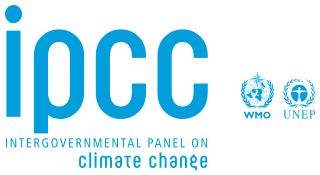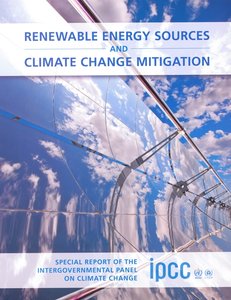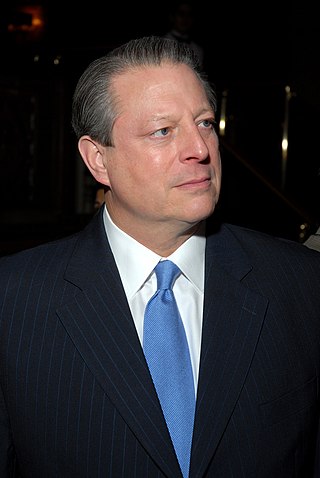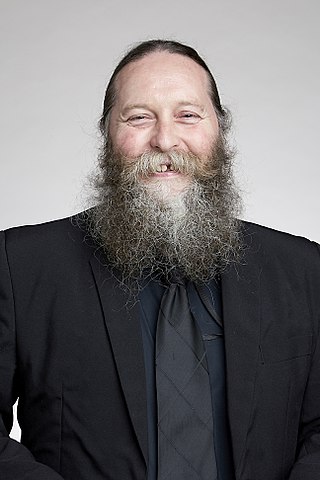Related Research Articles

The Intergovernmental Panel on Climate Change (IPCC) is an intergovernmental body of the United Nations. Its job is to advance scientific knowledge about climate change caused by human activities. The World Meteorological Organization (WMO) and the United Nations Environment Programme (UNEP) established the IPCC in 1988. The United Nations endorsed the creation of the IPCC later that year. It has a secretariat in Geneva, Switzerland, hosted by the WMO. It has 195 member states who govern the IPCC. The member states elect a bureau of scientists to serve through an assessment cycle. A cycle is usually six to seven years. The bureau selects experts to prepare IPCC reports. It draws the experts from nominations by governments and observer organizations. The IPCC has three working groups and a task force, which carry out its scientific work.

Bert Rickard Johannes Bolin was a Swedish meteorologist who served as the first chairman of the Intergovernmental Panel on Climate Change (IPCC), from 1988 to 1997. He was professor of meteorology at Stockholm University from 1961 until his retirement in 1990.

Gavin A. Schmidt is a British climatologist, climate modeler and Director of the NASA Goddard Institute for Space Studies (GISS) in New York, and co-founder of the award-winning climate science blog RealClimate.

The Second Assessment Report (SAR) of the Intergovernmental Panel on Climate Change (IPCC), published in 1995, is an assessment of the then available scientific and socio-economic information on climate change. The report was split into four parts: a synthesis to help interpret UNFCCC article 2, The Science of Climate Change, Impacts, Adaptations and Mitigation of Climate Change, Economic and Social Dimensions of Climate Change. Each of the last three parts was completed by a separate Working Group (WG), and each has a Summary for Policymakers (SPM) that represents a consensus of national representatives.
Donna Laframboise is a Canadian investigative journalist, writer, and photographer. She has published critical reviews of the Intergovernmental Panel on Climate Change and its reports for the United Nations.
Michael Oppenheimer is the Albert G. Milbank Professor of Geosciences and International Affairs in the Princeton School of Public and International Affairs, the Department of Geosciences, and the High Meadows Environmental Institute at Princeton University. He is the director of the Center for Policy Research on Energy and the Environment (C-PREE) at the Princeton School of Public and International Affairs and Faculty Associate of the Atmospheric and Ocean Sciences Program and the Princeton Institute for International and Regional Studies.
Richard S. J. Tol is a professor of economics at the University of Sussex. He is also professor of the economics of climate change at the Vrije Universiteit Amsterdam. He is a member of the Academia Europaea.

The IPCC Fourth Assessment Report (AR4) is a report on climate change created with the help of a large number of contributors, both scientists and governmental representatives. There has been considerable political controversy over a small number of errors found in the report, and there have been calls for review of the process used to formulate the report. The overwhelming majority view of scientists with expertise in climate change is that errors, when found, are corrected, and the issues as identified do not undermine the conclusions of the report that the climate system is warming in response to increased levels of greenhouse gases, largely due to human activities.
The Burtoni Award was created in 2003 by a group of leading experts and policy makers in the field of climate change. It is named for the Canadian science pioneer Ian Burton. Its purpose is to recognize outstanding contributions to the science of adaptation to climate change. The award is named after the first recipient of the award, Ian Burton, an emeritus professor at the University of Toronto and a pioneer in the field of adaptation to climate change and extreme events and disasters. Ian has contributed to three assessment reports of the IPCC and the recent Special Report on Extremes (SREX).

The United Nations Intergovernmental Panel on Climate Change (IPCC) published a special report on Renewable Energy Sources and Climate Change Mitigation (SRREN) on May 9, 2011. The report developed under the leadership of Ottmar Edenhofer evaluates the global potential for using renewable energy to mitigate climate change. This IPCC special report provides broader coverage of renewable energy than was included in the IPCC's 2007 climate change assessment report, as well as stronger renewable energy policy coverage.

The Fifth Assessment Report (AR5) of the United Nations Intergovernmental Panel on Climate Change (IPCC) is the fifth in a series of such reports and was completed in 2014. As had been the case in the past, the outline of the AR5 was developed through a scoping process which involved climate change experts from all relevant disciplines and users of IPCC reports, in particular representatives from governments. Governments and organizations involved in the Fourth Report were asked to submit comments and observations in writing with the submissions analysed by the panel. Projections in AR5 are based on "Representative Concentration Pathways" (RCPs). The RCPs are consistent with a wide range of possible changes in future anthropogenic greenhouse gas emissions. Projected changes in global mean surface temperature and sea level are given in the main RCP article.
Peter Bullock was a soil scientist whose initial work in the field of soil micromorphology preceded an interest in land degradation. His advocacy of the need to treat soil as a sustainable resource led to his appointment to the Intergovernmental Panel on Climate Change. Bullock contributed to the reports of the IPCC, which was awarded the Nobel Peace Prize in 2007.
Mohan Munasinghe is a Sri Lankan physicist, engineer and economist with a focus on energy, water resources, sustainable development and climate change. He was the 2021 Blue Planet Prize Laureate, and Vice-Chair of the Intergovernmental Panel on Climate Change (IPCC), which shared the 2007 Nobel Peace Prize with former Vice-President of the United States Al Gore. Munasinghe is the Founder Chairman of the Munasinghe Institute for Development. He has also served as an honorary senior advisor to the government of Sri Lanka since 1980.
Michael Hulme is Professor of Human Geography in the Department of Geography at the University of Cambridge, and also a Fellow of Pembroke College, Cambridge. He was formerly professor of Climate and Culture at King's College London (2013-2017) and of Climate Change in the School of Environmental Sciences at the University of East Anglia (UEA).

The 2007 Nobel Peace Prize was shared, in two equal parts, between the Intergovernmental Panel on Climate Change (IPCC) and United States former vice president, Al Gore "for their efforts to build up and disseminate greater knowledge about man-made climate change, and to lay the foundations for the measures that are needed to counteract such change".

Thomas C. Heller is a climate policy lawyer and academic. He currently serves as the chairman of the board for Climate Policy Initiative, an organization he founded in 2009 that works to improve energy and land use policies, with offices and programs in Brazil, China, Europe, India, and Indonesia, and the United States.
The Intergovernmental Panel on Climate Change (IPCC) has organized many of the risks of climate change into five "reasons for concern." The reasons for concern show that these risks increase with increases in the Earth's global mean temperature. The IPCC's five reasons for concern are: threats to endangered species and unique systems, damages from extreme climate events, effects that fall most heavily on developing countries and the poor within countries, global aggregate impacts, and large-scale high-impact events. The five reasons for concern are described in more detail below. The following descriptions are based on information from the IPCC's Third (TAR) and Fourth Assessment Reports (AR4), published in 2001 and 2007, respectively.

Cynthia E. Rosenzweig is an American agronomist and climatologist at NASA Goddard Institute for Space Studies, located at Columbia University, "who helped pioneer the study of climate change and agriculture." She is an adjunct senior research scientist at the Columbia Climate School and has over 300 publications, over 80 peer-reviewed articles, has authored or edited eight books. She has also served in many different organizations working to develop plans to manage climate change, at the global level with the IPCC as well as in New York City after Hurricane Sandy.

Pete Smith is Professor of Soils and Global change at the University of Aberdeen where he directs the Scottish Climate Change Centre of Expertise, ClimateXChange.

Raymond Ward Arritt was an American agronomist whose research focused on agricultural meteorology. He taught at Iowa State University from 1993 until his death in 2018. At Iowa State, he was responsible for operating the meteorological data repository Iowa Environmental Mesonet. He was one of three Iowa State faculty who contributed to the fourth (AR4) Intergovernmental Panel on Climate Change (IPCC) assessment report, which led to the IPCC sharing the 2007 Nobel Peace Prize with Al Gore.
References
- ↑ https://newsletter.blogs.wesleyan.edu/2018/09/13/yohe-siry-sultan-awarded-wesleyan-prize-for-excellence-in-research/
- ↑ "Wesleyan University". Archived from the original on October 21, 2004. Retrieved 2009-09-28.
{{cite web}}: CS1 maint: bot: original URL status unknown (link) - ↑ "The Nobel Peace Prize 2007 - Press Release". Archived from the original on 2010-01-09. Retrieved 2010-02-05.
- ↑ "Wesleyan University". Archived from the original on May 13, 2008. Retrieved 2009-09-25.
- ↑ "Fellows, College of the Environment - Wesleyan University". Archived from the original on May 30, 2010. Retrieved 2010-06-12.
{{cite web}}: CS1 maint: bot: original URL status unknown (link) - ↑ "Gary Yohe". Wesleyan University. Retrieved 8 February 2015.
- ↑ "Archived copy" (PDF). Archived from the original (PDF) on 2013-10-04. Retrieved 2013-10-01.
{{cite web}}: CS1 maint: archived copy as title (link) - ↑ Senate hearing on the Stern Review